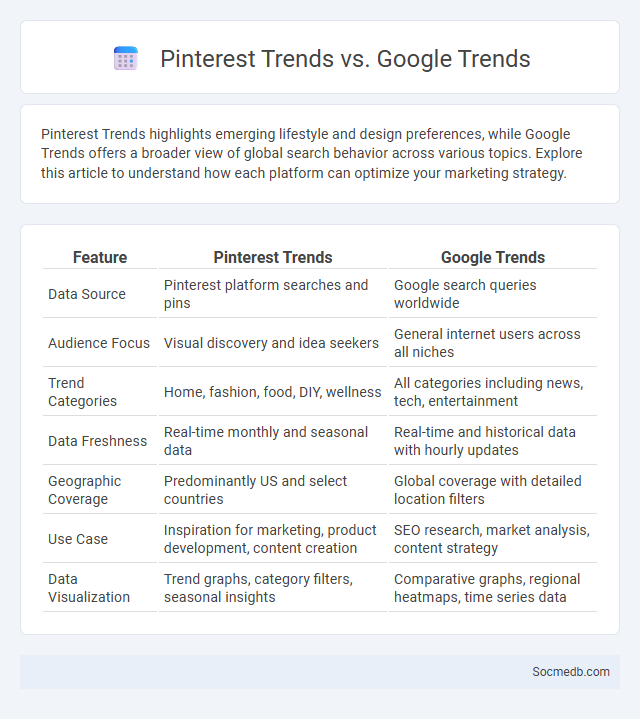
Photo illustration: Pinterest Trends vs Google Trends
Pinterest Trends highlights emerging lifestyle and design preferences, while Google Trends offers a broader view of global search behavior across various topics. Explore this article to understand how each platform can optimize your marketing strategy.
Table of Comparison
| Feature | Pinterest Trends | Google Trends |
|---|---|---|
| Data Source | Pinterest platform searches and pins | Google search queries worldwide |
| Audience Focus | Visual discovery and idea seekers | General internet users across all niches |
| Trend Categories | Home, fashion, food, DIY, wellness | All categories including news, tech, entertainment |
| Data Freshness | Real-time monthly and seasonal data | Real-time and historical data with hourly updates |
| Geographic Coverage | Predominantly US and select countries | Global coverage with detailed location filters |
| Use Case | Inspiration for marketing, product development, content creation | SEO research, market analysis, content strategy |
| Data Visualization | Trend graphs, category filters, seasonal insights | Comparative graphs, regional heatmaps, time series data |
Introduction to Trend Analysis Tools
Trend analysis tools on social media analyze real-time data to identify emerging patterns and popular topics across platforms like Twitter, Instagram, and TikTok. These tools track hashtags, keywords, and user engagement metrics to help you understand audience interests and predict future trends. Utilizing trend analysis enables more effective content creation and strategic marketing decisions tailored to current social media dynamics.
Overview of Pinterest Trends
Pinterest Trends reveals real-time insights into popular searches and emerging topics, highlighting seasonal patterns and user interests across categories like home decor, fashion, and recipes. Utilizing AI-driven analytics, Pinterest provides marketers and content creators with valuable data to optimize campaign targeting and content strategies. The platform's trend dashboard offers localized metrics, allowing brands to tailor their approaches based on regional and demographic fluctuations in user engagement.
Features of Google Trends
Google Trends provides real-time insights into search interest by displaying data on trending topics, keywords, and geographic search patterns. Its interactive graphs allow users to compare the popularity of multiple search terms, analyze seasonality, and identify emerging social media trends globally or locally. The platform supports keyword research, content strategy, and competitive analysis by highlighting spikes in search volume and related queries across various social media platforms.
What Is Trends (by TikTok)?
Trends on TikTok refer to popular, rapidly spreading challenges, sounds, hashtags, or video formats that captivate users worldwide. These trends often emerge from viral content and shape user engagement by inspiring creative participation and community interaction. TikTok's algorithm promotes trending content, fueling visibility and accelerating the adoption of new trends across diverse demographics.
Data Sources: Comparing Pinterest, Google, and Trends
Pinterest, Google, and Google Trends offer distinct data sources essential for social media analytics and marketing strategies. Pinterest provides visual discovery data focusing on user interests and emerging trends through pins and boards, while Google aggregates vast search queries, reflecting global user intent and behavior patterns. Google Trends complements this by delivering real-time insights into search term popularity, enabling marketers to track rising topics and seasonality in social media engagement.
Audience Insights and Demographics
Audience Insights provide detailed data on the age, gender, location, and interests of your social media followers, enabling precise content targeting. Demographics analysis helps identify key segments of your audience, improving engagement and conversion rates. Understanding these metrics allows you to tailor your marketing strategies effectively to meet Your audience's preferences and behaviors.
Trend Discovery and Search Functionality
Advanced trend discovery tools on social media leverage AI algorithms to analyze vast amounts of user-generated content, identifying emerging topics and viral hashtags in real time. Enhanced search functionality integrates natural language processing, enabling users to find relevant posts, profiles, and multimedia content through intuitive queries and filters. These features collectively improve user engagement by facilitating the discovery of timely and personalized information across platforms like Twitter, Instagram, and TikTok.
Use Cases: Marketing Strategies
Social media marketing strategies leverage platforms like Facebook, Instagram, and LinkedIn to target specific audiences through paid ads, influencer partnerships, and content marketing. Brands utilize data analytics to optimize campaigns, increase engagement, and enhance customer experience by personalizing messages and tracking conversion rates. Effective strategies also include community building and real-time interaction to drive brand loyalty and increase sales.
Advantages and Limitations of Each Platform
Facebook offers extensive reach and detailed targeting for advertisers, making it ideal for brand awareness and community building, but it faces challenges with declining organic reach and privacy concerns. Instagram excels in visual storytelling and influencer marketing, attracting younger demographics; however, its algorithm can limit content visibility and foster superficial engagement. Twitter provides real-time updates and direct communication with audiences, yet struggles with misinformation and character limits that constrain message depth.
Choosing the Best Trend Tool for Your Needs
Selecting the best trend tool for your social media requires analyzing features like real-time data tracking, hashtag performance, and influencer analytics. Tools such as Google Trends, BuzzSumo, and TrendSpottr offer specialized insights tailored to various audiences, helping you target and engage effectively. Your optimal choice depends on the platform you focus on and the specific metrics you want to prioritize for content strategy.
 socmedb.com
socmedb.com